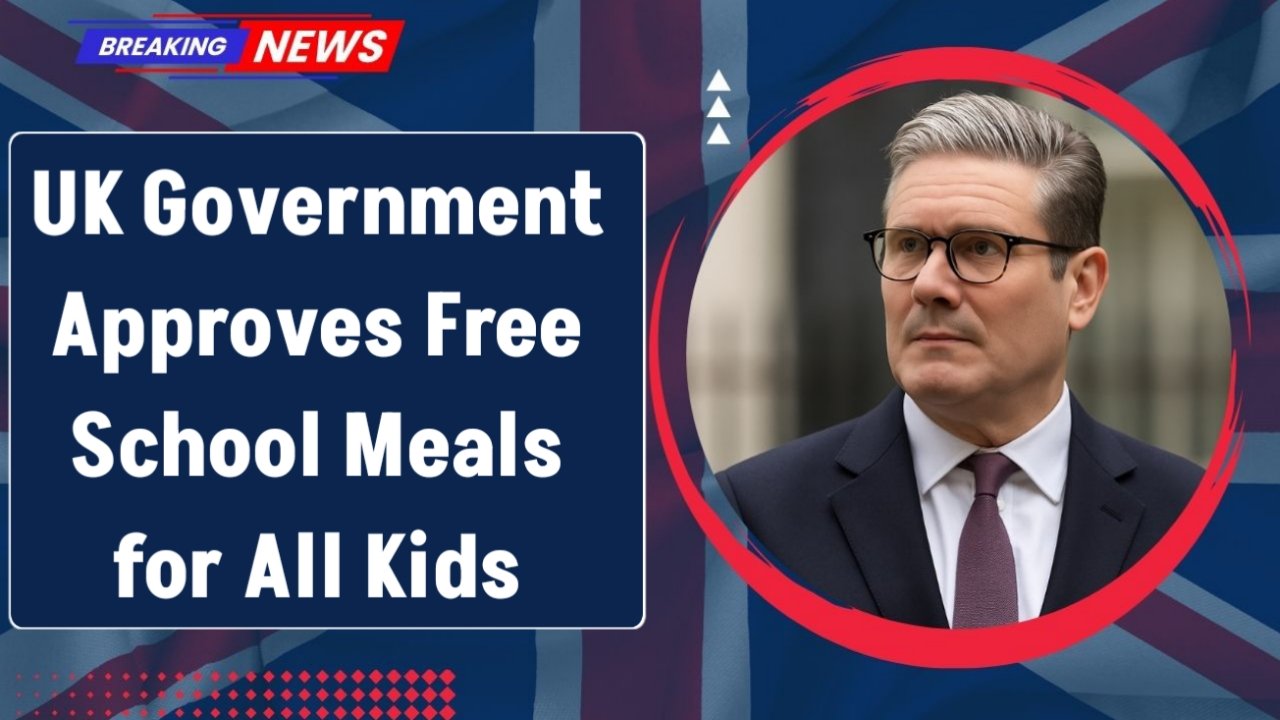In a landmark move that has sent waves of relief across millions of UK households, the government has officially approved a policy granting free school meals to all children, regardless of household income. This announcement comes after years of campaigning by parents, teachers, and child welfare organisations, finally delivering what many are calling a “historic breakthrough” for education and equality.
What Has Been Announced?
The Department for Education confirmed that starting from the Autumn Term 2025, every primary and secondary school student in the UK will be eligible for free school meals. Unlike the previous system, families will no longer need to meet income thresholds or be on Universal Credit to qualify.
This universal scheme is being rolled out to improve children’s health, support working families, and reduce the stigma associated with free meals.
Why This Is A Big Deal
Until now, free school meals were only available to children from low-income families or those receiving certain government benefits. Many children just above the income threshold were left out, despite their families facing real financial pressure.
With rising food costs and the ongoing cost of living crisis, this new policy has been welcomed as a lifeline for millions of parents who struggle to provide healthy lunches for their kids every day.
How It Will Work
The scheme will be implemented across all state-funded schools in England, Wales, Scotland, and Northern Ireland. The government has pledged a special education budget to cover the cost of meals, training kitchen staff, and upgrading facilities where necessary.
Each child will be entitled to one hot, nutritious meal per school day, prepared onsite. Schools will retain the flexibility to create menus that cater to dietary and cultural needs, ensuring every child is included.
Impact On Families
For an average family with two school-aged children, this move could save over £1,000 per year. The financial relief is particularly significant for households who do not qualify for benefits but are still burdened by rising household expenses.
Parents have expressed immense gratitude online and through local news outlets, calling the new policy “a blessing” and “a huge help in tough times.”
What Teachers & Schools Are Saying
Teachers’ unions and headteachers have applauded the decision. The National Education Union (NEU) said it will have a direct positive impact on classroom behaviour, energy levels, and academic focus.
Educators often witness how hunger affects pupils’ ability to learn, and with free meals now guaranteed for all, schools expect a rise in both attendance and performance.
Reaction From Campaigners
Charities such as Child Poverty Action Group, Marcus Rashford’s End Child Food Poverty initiative, and School Food Matters have welcomed the change, noting it as a “giant leap toward child equality.”
Marcus Rashford himself posted on social media saying, “This is what we fought for. No child should ever sit in class hungry again.”
Campaigners believe this is just the beginning, and future efforts should include free breakfast clubs and extended meal support during school holidays.
The Funding Behind The Policy
The government announced a new £3.2 billion annual education and welfare budget, which includes allocations specifically for school meals, kitchen expansions, and training.
This is part of the wider Child Welfare Reform Plan, which aims to reduce inequality and promote better long-term public health outcomes. Ministers have emphasised that this investment will not come at the cost of other services but through budget reallocations and economic planning.
Addressing Public Concerns
Some critics initially raised questions about funding sustainability, potential food waste, and whether universal meals were necessary for wealthier families. However, public opinion strongly supports the policy.
Polls conducted by YouGov and BBC show that more than 78% of UK adults support free school meals for all children, regardless of income. Most agree that investing in children’s health and education now saves public money in the future through reduced healthcare costs and better outcomes.
How This Compares Globally
Countries like Finland, Sweden, and South Korea have long offered free meals to all school children, with notable success in reducing educational inequality and improving overall nutrition.
By joining this global movement, the UK is taking a strong step forward in aligning itself with nations prioritising education equity and child wellbeing.
What Parents Need To Do
The best part for families is that no applications or forms will be required. Schools will automatically enrol all students into the programme starting in September 2025. Parents will receive a communication from their local school with detailed information about meal plans and start dates.
Families with special dietary needs can contact the school’s meal service to discuss menu options. Schools are advised to create menus that reflect diversity, allergy awareness, and sustainability.
Long-Term Goals
The government views this policy as part of a larger effort to reduce child poverty, increase attendance, and improve national health standards. Alongside free meals, future goals include:
- Expanding free breakfast clubs
- Ensuring holiday food support
- Adding nutrition education to the curriculum
- Collaborating with local farms and producers
If successfully implemented, this policy could transform school life for the next generation and set a new standard for how developed nations support children.
Conclusion
This bold move by the UK government marks a new chapter in the country’s commitment to child welfare and equality. By eliminating the income barrier and ensuring that every child gets at least one nutritious meal every day, the country is investing in its future — one lunch tray at a time.
For families who’ve spent years demanding change, the message is finally clear: your voices were heard, and your children will no longer go hungry at school.

